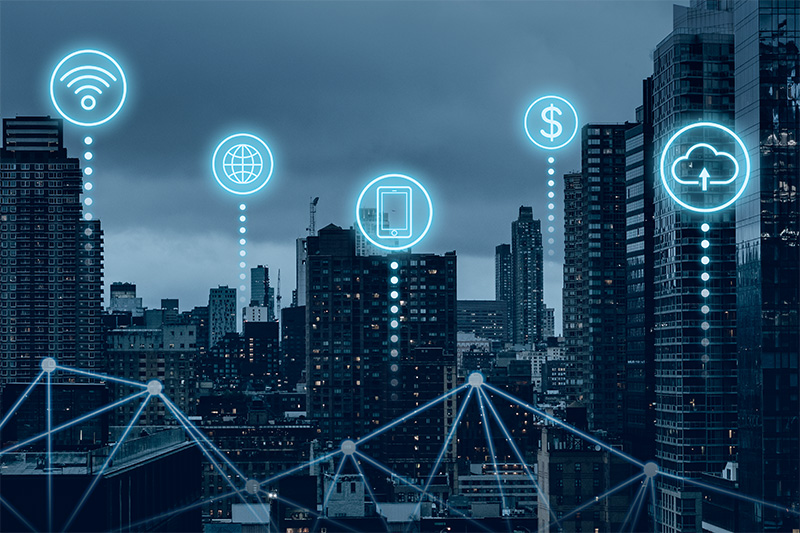In our rapidly changing world urban areas are expanding rapidly. To address the growing complex issues of managing cities and sustainable development, the idea of smart cities is gaining traction. Smart cities incorporate advanced technologies in their infrastructure and services to improve living conditions for citizens while maximizing the efficiency of resources. Technology’s role in modern infrastructure is vital because it helps with everything from efficiency in energy use to better transport systems. This article focuses on the transformational impact of technology on the development of smart cities. Development of intelligent cities, and the ways it impacts the infrastructure’s design and running.
The Foundations of Smart Cities
Smart cities are more than a city equipped with fast internet speeds or smart traffic lights. It’s an integrated ecosystem in which information-driven decisions increase the quality of service and decision-making. At the heart of smart cities lies the Internet of Things (IoT), which connects devices, sensors, systems, and data to exchange and collect information. This connectivity allows cities to track, analyze, and efficiently manage their resources, whether it’s energy distribution, water supply, waste management, or OS&E Procurement, ensuring that every element of urban life is optimized for efficiency and sustainability.
Urban planners are turning to technology for the design of intelligent roads, buildings as well as public spaces that meet the demands of their customers. Through integrated technology, cities can keep track of everything from air quality to energy consumption, which allows authorities to implement real-time changes that minimize the amount of waste generated and raise sustainable development.
Energy Efficiency and Sustainability
One of the biggest issues smart cities are trying to address is the issue of energy use. As urban populations improve, conventional energy grids struggle to cope with the demand. Smart grids made possible with IoT technology, allow better energy distribution together with actual-time data to alter supply depending upon demand. Smart meters at home and in businesses prepare consumers with complete data on their usage of electricity which encourages more sustainable behavior and decreases overall consumption.
Smart cities also are promoting the use of renewable sources of energy like wind and solar energy. Systems for managing energy monitor the resources available save excess power for future use and reduce the dependence on renewable resources. In some cases, cities have solar streetlamps which do not just save energy, but also lower operating costs. A shift toward energy-efficient infrastructure means that smart cities help contribute to a more sustainable and environmentally friendly future.
Smart Transportation Systems
Congestion in traffic is among the major issues faced by contemporary urban centers. Smart cities are solving this issue with the benefit of smart transport systems. The systems utilize data taken from GPS sensors, sensors, and cameras to improve the flow of traffic, minimize delay, and boost safety.
Intelligent traffic lights that alter according to the traffic situation are currently being used across cities to allow for more efficient moving of pedestrians as well as vehicles. In addition, autonomous vehicles are now an integral element of today’s infrastructure. The vehicles are based on the latest algorithms and live data to efficiently navigate reduce the chance of crashes and decrease emissions by improving the routes.
Transportation for public use is an essential component of smart cities. A lot of cities have been together advanced technology to keep track of the speed of trains and buses trains, making sure that the schedules are optimized and that delays are reduced. Residents can receive live updates via mobile applications which increases convenience and encourages people to use public transportation which in turn reduces traffic pollution and congestion.
Smart Buildings and Infrastructure
Smart buildings are changing urban landscapes. Through the integration of technologies including IoT sensors artificial intelligence (AI) and machine learning smart buildings can regulate and monitor lighting, heating as well as security devices to boost energy efficiency as well as ease of living for the residents. Smart buildings can also aid in cities’ sustainability objectives by cutting down on energy use and the environmental impacts of urban development.
The application of intelligent technologies extends into larger infrastructure projects such as bridges, roads as well as utilities. Sensors that are embedded into infrastructure track wear and tear, which allows authorities to carry out prompt fixes and maintenance. In preventing bigger issues before their occurrence Smart cities can ensure their infrastructure is secure, reliable, and long-lasting in time.
Data and Security
Since smart cities heavily rely on data security, protecting data security and security is of paramount importance. Huge quantities of data captured from cameras and sensors in smart cities can be at risk of cyberattacks when not adequately secured. To protect themselves from these threats Smart cities should take strong cybersecurity strategies, such as firewalls, encryption, as well as periodic updates to hardware and software.
The cities are also in the process of implementing data privacy laws to safeguard the privacy of citizens’ data. These laws ensure that the data is utilized responsibly and ethically while ensuring the transparency of how data is taken and distributed.
The Role of Construction and Project Management
The importance of Construction and Project Management Companies in the development of smart cities is vital. They’re responsible for integrating cutting-edge technology in infrastructure initiatives, making sure that roads, smart buildings, and other utilities are not just functional, but also effective and eco-friendly. Through collaboration with city planners and tech service providers, construction companies have a crucial role to play in transforming the dream of smarter cities into a reality. They employ advanced techniques for managing the most complex projects to ensure timeframes are adhered to and that the resources are employed efficaciously. Their participation ensures that the infrastructure meets the longer-term objectives of sustainability and development.
Conclusion
The evolution of urban areas into smart cities is testimony to the potential of technology to shape modern infrastructure. Thanks to technology, the benefit from IoT, AI, and smart grids cities are getting more energy efficient, sustainable, and liveable. In the future, urban development is dependent on technological advancements to build smarter cities that will benefit both the citizens as well as the environment. From energy efficiency to intelligent transport, the importance technology plays in modern day infrastructure is opening the door to a more sustainable and environmentally sustainable future.




